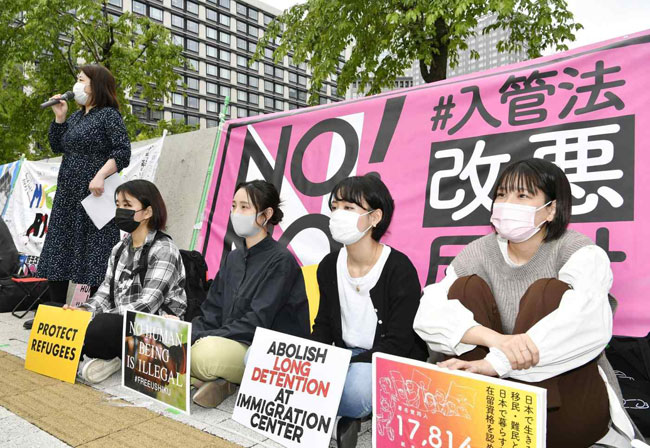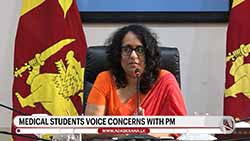Sri Lankanís death fuels debate on long detentions in Japan
May 17, 2021 08:32 pm
Japan’s controversial immigration bill designed to reform the deportation process has faced staunch opposition in parliament, with the recent death of a Sri Lankan woman in custody raising questions about the nation’s lengthy detentions of foreigners.
Opposition lawmakers have seized on her death to denounce the bill, which they fear would make deportation easier, even as the ruling coalition moves to pass the measure in the lower house next week.
Ratnayake Liyanage Wishma Sandamali, 33, was placed in an Aichi Prefecture detention center in August last year for overstaying her visa. She first complained of a stomach ache and other symptoms in January and died on March 6 despite receiving medical attention from doctors.
Her death set off an outcry among immigration advocates. Wishma’s family held an online press conference from Sri Lanka in April, demanding an explanation from the authorities. Her two sisters have since arrived in Japan.
Opposition lawmakers have also called for a probe into the circumstances of her death.
Yukio Edano, leader of the opposition Constitutional Democratic Party of Japan, says that the Ministry of Justice has not been forthcoming with information.
“We can’t move forward with the deliberations without finding out the truth,” Edano said, insisting the probe must come first.
The ruling Liberal Democratic Party proposed voting on the bill at the lower house’s the Committee on Judicial Affairs on Friday, but met with pushback from the opposition.
To hold up the process, the Constitutional Democrats and other opposition parties submitted a motion to dismiss Hiroyuki Yoshiie, an LDP member who chairs the Judicial Affairs Committee. The committee vote is expected to be delayed as a result, but the LDP looks to approve the legislation in the lower house next week.
At issue is a provision allowing the deportation of asylum seekers applying for the third time or more.
Asylum-seekers now receive exemptions from deportation while their applications are being processed.
The bill’s aim is to prevent gaming the system via repeat applications and to cut down on the number of people kept in detention facilities. But a senior CDP member blasted the provision as a “three strikes” rule that endangers applicants.
“The deportations may amount to death penalties,” the lawmaker said. The CDP submitted 10 revisions to the bill, including one to remove the asylum application cap.
An estimated 80,000 foreign nationals were residing illegally in Japan as of last July, data from the Immigration Services Agency shows. Individuals contesting their deportation orders numbered around 3,000 at year-end.
A portion of those seek refugee status, citing the potential of persecution if they are sent back home. Such applicants are placed in temporary holding facilities pending the review of their petitions. More than 1,000 people were in the holding facilities nationwide at the end of 2019.
More than 40% have resided at the holding sites for half a year or longer. Many of the foreign nationals targeted by deportation orders have established roots in Japan, such as through raising children here. Such situations stand in the way of returning to their home countries.
As a result, more people end up in holding facilities. To address this, the bill allows authorized relatives or organizations to take on the responsibility of supervising potential deportees.
The proposal also opens up a pathway for residency that certifies candidates as unable to return to their homelands, granting them the same long-term residency status as full-fledged refugees.
Japan has long faced criticism for accepting tiny numbers of refugees. The approval rate for applications amounted to just 0.4% in 2019, according to the Japan Association for Refugees -- far below countries in the Americas and Europe. Canada’s rate approached 60%.
Opposition parties have put forward a counterproposal that would put the refugee certification in the hands of an independent commission as a way to ensure fairness and impartiality.
The ruling coalition is determined to pass the immigration bill in this legislative session before the lower house election this fall. If the legislation is delayed until an extra session closer to the election, the Diet may end up spending time debating the alternate bill by the opposition -- a scenario that would not favor the ruling bloc.
If it’s not passed during the current session, the bill could be scrapped entirely once Prime Minister Yoshihide Suga dissolves the lower house for a snap election.
Source: Nikkei Asia
-Agencies












